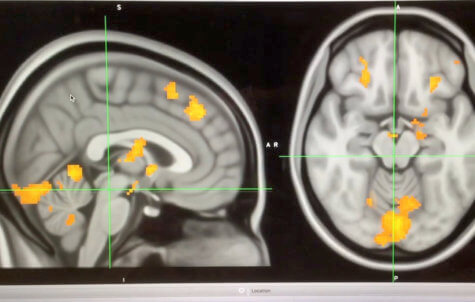DALLAS — People who more deeply feel the happiness or sadness of others process music differently in the brain than people who do not possess such high levels empathy, a new study finds.
“High-empathy and low-empathy people share a lot in common when listening to music, including roughly equivalent involvement in the regions of the brain related to auditory, emotion, and sensory-motor processing,” said lead author Zachary Wallmark, assistant professor at Southern Methodist University.
For all the similarities, though, scientists found that high-empathy people tend to enjoy listening to music more than others because they connect to it on a deeper level, using more of their brain’s social wiring than low-empathy people. Brain regions used for social awareness, reward, and the regulation of social emotions are activated to a greater degree for these individuals when music is playing.
“This may indicate that music is being perceived weakly as a kind of social entity, as an imagined or virtual human presence,” explains Wallmark.
Previous research indicated that about 20% of the population is highly empathetic. This study, conducted by researchers at SMU and UCLA, was the first to indicate a neural account of the music-empathy connection.

To reach their findings, researchers played familiar and unfamiliar music to 20 UCLA students who were scanned in an MRI machine while listening to the selections. Afterwards, the students completed a questionnaire used to assess their level of empathy. Using the MRI scans, researchers then identified which areas of the participants’ brains were responsive to the music, while comparing the results between students who proved to be highly-empathic, versus ones who showed lesser levels of empathy.
Familiar music seemed to activate the pleasure centers of the brain more frequently in more empathic students, the results showed. This region of the brain, considered its “reward center,” tends to bring about positive emotions in people. Similarly, those with high levels of empathy showed more activity in areas of the prefrontal cortex that controls aspects social behavior, including how we perceive the actions and intentions of others. This finding led the authors to believe that listening to music is akin to an actual human encounter in empathic individuals.
“The study shows on one hand the power of empathy in modulating music perception, a phenomenon that reminds us of the original roots of the concept of empathy — ‘feeling into’ a piece of art,” explains senior author Marco Iacoboni, a neuroscientist at UCLA, in the release. “On the other hand, the study shows the power of music in triggering the same complex social processes at work in the brain that are at play during human social interactions.”
The study was published April 6, 2018 in the journal Frontiers in Behavioral Neuroscience.
